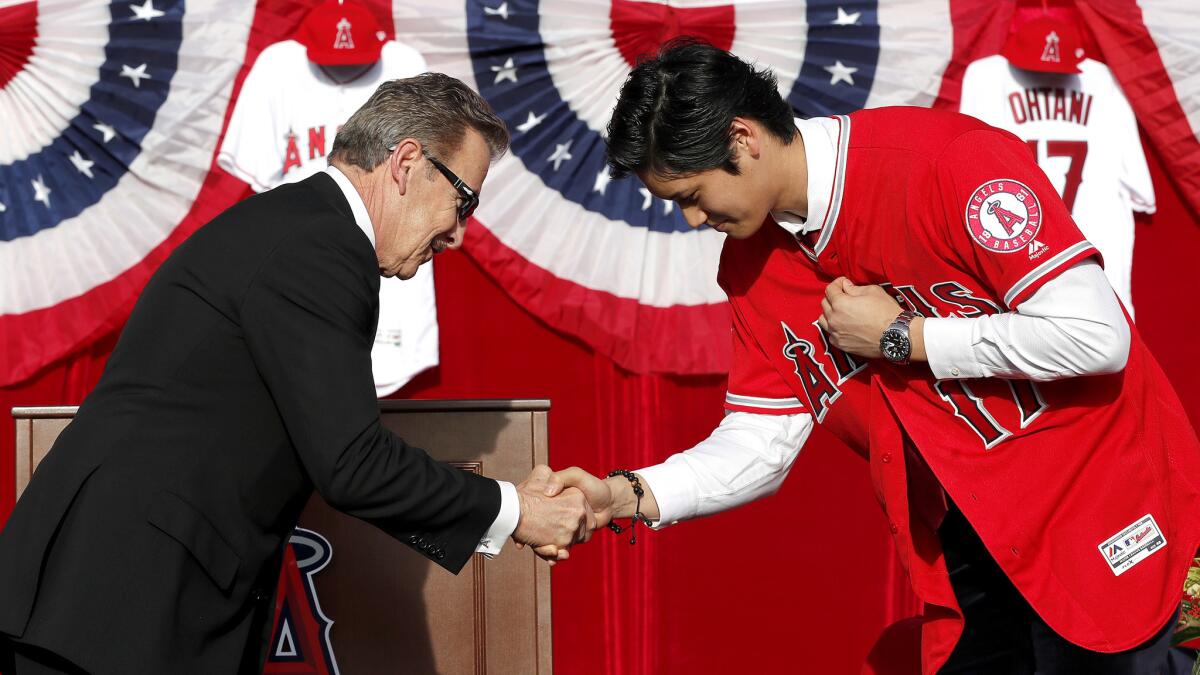Angels introduce Japanese star Shohei Ohtani, their prized signing

- Share via
Shohei Ohtani packed a warm velvet suit for this occasion. When the Japanese two-way sensation arrived in the United States last month, he was unsure what weather would await at his ultimate destination. More than two dozen Major League Baseball teams courted him in a circus-like environment, and posting rules dictated he make a decision by Dec. 21.
He made an unexpected choice, and made it sooner than expected. The Angels formally signed the 23-year-old to a minor league contract with a $2.315 million signing bonus. The Hokkaido Nippon-Ham Fighters, his Japanese club, will receive a $20-million posting fee, and the Angels’ total outlay will pale in comparison to Ohtani’s value.
On Saturday, the Angels introduced Ohtani under the afternoon sun on an 85-degree day in Anaheim. More than 1,000 fans gathered outside Angel Stadium, as the team sold concessions and stitched together his No. 17 jerseys one by one. Ohtani introduced himself in English, admitted his nerves, told a few jokes through an interpreter and grinned for photographs.
The Angels learned they had come upon this tremendous windfall only 28 hours earlier. At 11 a.m. Friday, general manager Billy Eppler answered a call from Ohtani’s agent while in assistant general manager Jonathan Strangio’s office.
The night before, the Angels hosted Ohtani at the ballpark for a second visit. They made their first presentation Monday night at the Los Angeles offices of Ohtani’s representatives, Creative Arts Agency.
When agent Nez Balelo sought to arrange a follow-up, the Angels had to work around the schedule of the Philadelphia Eagles, who adapted the ballpark into a practice field ahead of their Sunday game against the Rams. So the two sides met at night, and Eppler went to bed uncertain what would come next.
“Sleeping, that was the toughest part,” Eppler said.
He fleshed out other potential transactions to pass the time. When informed of the decision in the morning, Eppler jumped in celebration. At his desk, Strangio covered his head with his hands. As he tried to sit back down, Eppler fell to the floor and Strangio rushed over to help him up.
“I was just stunned,” Eppler said. “It was a pretty remarkable moment.”
He said he felt more emotional than when he learned he would be the Angels general manager. He compared the feeling to the days he married his wife, Catherine, and watched the birth of their son, Xander.
“This is a big moment for us regardless of the outcome,” Eppler said, “because of what we’re going to do and how we’re gonna make this commitment to have a guy be a two-way player.”
Baseball executives agree that Ohtani possesses the potential to be baseball’s best two-way player in a century, since Babe Ruth. Of course, Ruth competed at a much different time.
Ohtani said he regards Ruth as a God-like figure. Like him, Ohtani is superlatively talented, blessed with elite power and speed, a torrent of throwing strength and plenty of pitching acumen.
“I don’t think we’ve seen a pitcher of his caliber come into our organization for a long time,” manager Mike Scioscia said.
To accommodate Ohtani, the Angels are open to employing a six-man rotation. And, if they plan to keep Ohtani on the once-a-week starting schedule he followed in Nippon Professional Baseball, they must.
“That will make things a little easier for him,” Eppler said. “I think that could make it a little easier for everybody. We’re looking at a couple different models that have that type of alignment.”

The Los Angeles Angels of Anaheim officially welcomed their newest addition to the club, Japanese pitcher and slugger Shohei Ohtani, during an introductory news conference at Angel Stadium.
That was included in the concepts the Angels presented to Ohtani, in laying out the entire 2018 slate and offering estimates of when he could pitch and hit. One plan called for him to alternate rest and designated-hitter days in between starts on the mound. Another plan would have him hit only once per starting cycle. Either way, he will not play the outfield.
“The plans they proposed to me were great, but it’s not automatic,” Ohtani said through interpreter Matt Hidaka. “It’s something we’re gonna have to discuss. I’m gonna talk to the team, and we’ll continue to cement whatever plan we go with.”
It appears Ohtani will not begin the season on a pace to bat more than 250 times. He reached that threshold only once over five years in Japan.
“A lot of what we can do with him is gonna be based on his input,” Eppler said, “and the people who’ve worked with him in the past.”
Though they never met until Monday, Eppler estimated he has watched Ohtani play 10 times since 2013. He came away from the week’s encounters convinced the player’s approach to baseball was like Mike Trout’s — simple, above all else.
“This guy consumes all things baseball,” Eppler said. “There is not a lot else going on in his world.”
Follow Pedro Moura on Twitter @pedromoura
More to Read
Go beyond the scoreboard
Get the latest on L.A.'s teams in the daily Sports Report newsletter.
You may occasionally receive promotional content from the Los Angeles Times.







